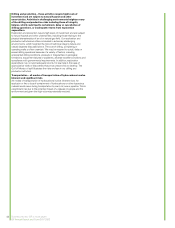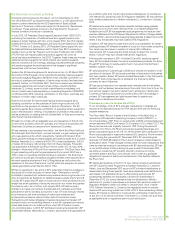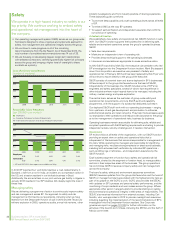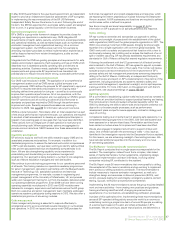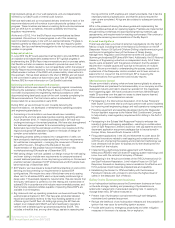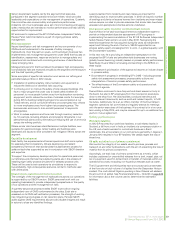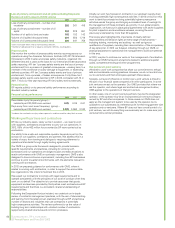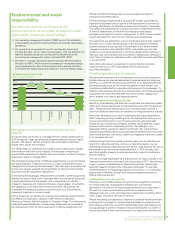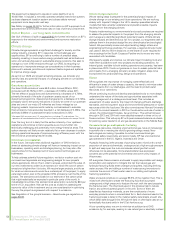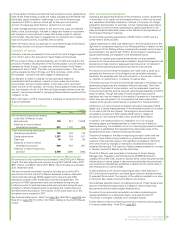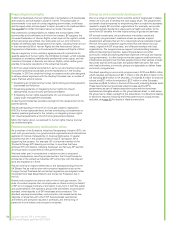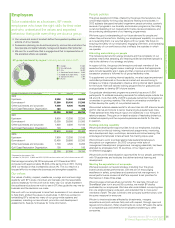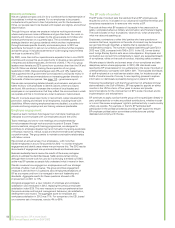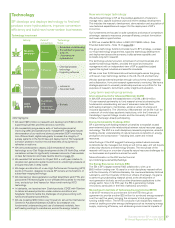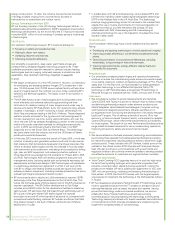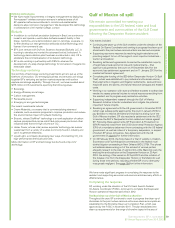BP 2012 Annual Report Download - page 56
Download and view the complete annual report
Please find page 56 of the 2012 BP annual report below. You can navigate through the pages in the report by either clicking on the pages listed below, or by using the keyword search tool below to find specific information within the annual report.
Business review: BP in more depth
BP Annual Report and Form 20-F 2012
54
Respecting human rights
In 2012 we developed a human rights policy in consultation with businesses
and functions, and we expect to launch it in 2013. The policy builds on
commitments in our code of conduct regarding communities, workforces
and the supply chain and we expect to report annually on its implementation.
See page 56 for further information about our code of conduct.
We understand our responsibility to respect the human rights of the
communities and workforces with whom we interact. BP supports the
Universal Declaration of Human Rights, which lays out the rights to which
all human beings are entitled. Our policy sets out our commitment to
respect all internationally recognized human rights, including those set out
in the International Bill of Human Rights and the International Labour
Organization’s Declaration on Fundamental Principles and Rights at Work.
We are a signatory to two voluntary agreements with implications for
specific aspects of human rights: the UN Global Compact, which includes
principles on protecting internationally proclaimed human rights, and the
Voluntary Principles on Security and Human Rights, which define good
practice for security operations in the extractive industry.
In 2011 we used external consultants to carry out a comparison between
our current policies and practices and the expectations in the Guiding
Principles. In 2012 we used the findings to create an action plan designed
to achieve closer alignment with the Guiding Principles over a number of
years. Planned actions include:
t Developing and implementing human rights training prioritizing specific
businesses and functions.
t Developing guidance on integrating human rights into impact
assessments and community grievance processes.
t Embedding human rights requirements into our procurement and
supply chain management processes.
A steering committee has provided oversight for the development of the
planned actions.
We are participating in the work of oil and gas industry organization
IPIECA’s human rights taskforce, and are contributing our experience to
develop practical guidance for the industry on integrating human rights
into impact assessments and community grievance processes.
More information about our approach to human rights may be found at
bp.com/humanrights.
Revenue transparency and business ethics
As a member of the Extractive Industries Transparency Initiative (EITI), we
work with governments, non-governmental organizations and international
agencies to improve transparency on revenue disclosures. In several
countries that are in the process of becoming EITI compliant, BP is
supporting the process. For example, BP is an active member of the
Trinidad & Tobago EITI steering committee. In countries that have
achieved EITI compliance, including Azerbaijan and Norway, BP submits
an annual report on payments to their governments.
We have taken part in consultations in relation to new or proposed
revenue transparency reporting requirements in the US and Europe for
companies in the extractive industries. BP will comply with the relevant
laws and regulations in force.
We are working to respond effectively to the standards arising from the
UK Bribery Act as well as other anti-corruption legislation such as the
Foreign Corrupt Practices Act and certain regulations promulgated under
the Dodd-Frank Wall Street Reform and Consumer Protection Act in
the US.
Bribery and corruption are serious risks in the oil and gas industry. Our
code of conduct requires that our employees or others working on behalf
of BP do not engage in bribery or corruption in any form in both the public
and private sectors. We operate a group-wide anti-bribery and corruption
standard, which applies to all BP employees and contractors. The
standard requires annual bribery and corruption risk assessments; due
diligence on all parties with whom BP does business; appropriate
anti-bribery and corruption clauses in contracts; and the training of
personnel in anti-bribery and corruption measures.
Enterprise and community development
We run a range of programmes to build the skills of businesses in places
where we work and to develop the local supply chain. The programmes
can benefit local companies by empowering them to reach the standards
needed to supply BP and other organizations. For example, we provide
training and share standards in areas such as health and safety. At the
same time BP benefits from the local sourcing of goods and services.
BP’s social investments, the contributions we make to social and
community programmes in locations where we operate, support
development activities that aim for a meaningful and sustainable impact.
We look for social investment opportunities that are relevant to local
needs, aligned with BP’s business, and offer partnerships with local
organizations. The programmes we support include building business
skills and developing enterprise, supporting education and other
community needs and sharing technical expertise with local and national
host governments. In a few locations we also support small community
infrastructure programmes that help people improve their access to basic
resources such as drinking water and public health services. We work
with local authorities, community groups and specialists to deliver these
community programmes.
Our direct spending on community programmes in 2012 was $90.6 million,
which included contributions of $31.7 million in the US, $16.3 million in the
UK (including $6.9 million to UK charities, of which $4.8 million for arts and
culture, and $2.1 million for education), $2.3 million in other European
countries and $40.3 million in the rest of the world, including disaster relief.
These reported amounts exclude social bonuses paid by BP to
governments as part of licence acquisition costs and that have been
capitalized as intangible assets on the group balance sheet. In such cases
the group has no direct oversight of the expenditure. Contributions relating
to economic recovery following the Deepwater Horizon oil spill are also
excluded, see page 60 for details of these contributions.


